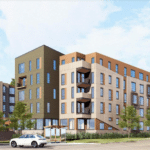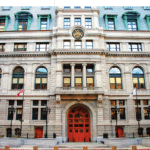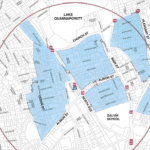
Developers Scrambled to Beat Lexington Rollback
Property owners scrambled to preserve their rights to develop multifamily housing in Lexington as the town approached a vote to scale back development opportunities.

Property owners scrambled to preserve their rights to develop multifamily housing in Lexington as the town approached a vote to scale back development opportunities.

Lexington officials took steps Monday to dramatically rein in its expansive MBTA Communities zoning districts in the face of significantly more development proposals than first anticipated.

The town of Holden, one of the first to defy the state’s MBTA Communities transit-oriented zoning law alongside Milton, has agreed to fall in line.

Auditor Diana DiZoglio drew a sharp rebuke from Attorney General Andrea Campbell, a top defender of the zoning law that eases regulations for multifamily housing in neighborhoods close to public transit.

Lexington officials are set to review developers’ proposals this week for projects that would generate a combined 201 new housing units in office parks and commercial districts.

The Massachusetts Supreme Judicial Court upheld the state’s power to sue communities that fail to comply with the MBTA Communities act, but ordered the state to draw up new regulations because of a procedural error.

Voters in Halifax, Marshfield and Wrentham rejected rezoning plans to add multifamily districts to comply with the MBTA Communities law.

The Greek philosopher Heraclitus stated centuries ago that change is the only constant in life. A few things expected to bring change to the Massachusetts real estate industry in 2025.

State officials cheered the news Friday that over 100 towns and cities in Eastern Massachusetts have now adopted zoning to comply with the MBTA Communities law instead of flouting it.

Duxbury voters resoundingly rejected a multifamily rezoning proposal after state officials said it failed to comply with the MBTA Communities law.

Lexington’s MBTA Communities rezoning prompted another major multifamily development proposal, replacing a trio of office buildings near the town center with a 319-unit apartment complex.

At issue: Does the attorney general’s office have the ability to use the courts to force Milton’s compliance with the MBTA Communities multifamily zoning law?
Whether we’re talking about Milton or its hangers-on, as long as the Legislature and the Healey administration remain in agreement, towns will eventually need to comply with the MBTA Communities law.

Days before attorneys representing Massachusetts state government and the town of Milton face off in a dispute over the MBTA Communities law, Gov. Maura Healey and Attorney General Andrea Campbell sought to spotlight the cities and towns that are taking the opposite tack.

Three former attorneys general, two towns, one state rep and a number of advocates and industry groups have all filed briefs with the the Supreme Judicial Court on whether Attorney General Andrea Campbell has the legal authority to compel Milton to comply with the MBTA Communities Act.

Massachusetts suburban housing development is dominated by large single-family homes and mid-rise apartment construction, with little new inventory of modest-sized homes and price tags to match.

Wakefield joined Marshfield and Milton in the suburban resistance to the MBTA Communities housing production law, rejecting three proposals to rezone an area near transit for multifamily development.
With nearly every community complying, there’s still work to be done to make sure new zoning translates to new homes.

Wary of a backlash at an upcoming town meeting, Burlington officials approved a plan to comply with the MBTA Communities law by rezoning four areas for multifamily development that already include large housing complexes.

A single justice of the Supreme Judicial Court recommended that the full court hear Attorney General Andrea Campbell’s case against the town of Milton for failing to comply with a state rezoning law, but the justice did not go along with the accelerated timetable she sought.